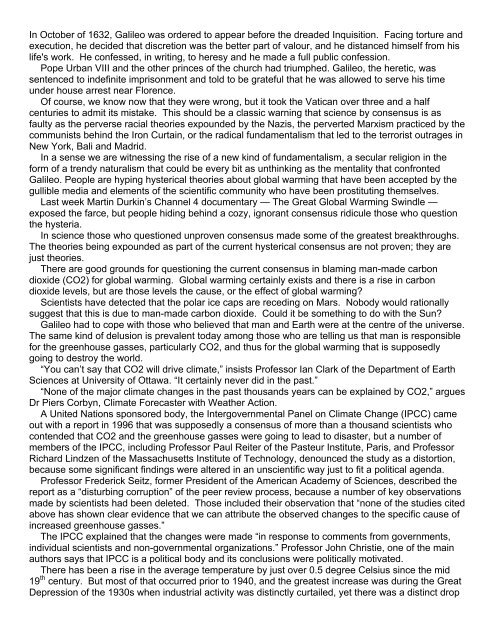Consensus or Con Job? - Robert Scherer Home Page
Consensus or Con Job? - Robert Scherer Home Page
Consensus or Con Job? - Robert Scherer Home Page
You also want an ePaper? Increase the reach of your titles
YUMPU automatically turns print PDFs into web optimized ePapers that Google loves.
In October of 1632, Galileo was <strong>or</strong>dered to appear bef<strong>or</strong>e the dreaded Inquisition. Facing t<strong>or</strong>ture and<br />
execution, he decided that discretion was the better part of valour, and he distanced himself from his<br />
life's w<strong>or</strong>k. He confessed, in writing, to heresy and he made a full public confession.<br />
Pope Urban VIII and the other princes of the church had triumphed. Galileo, the heretic, was<br />
sentenced to indefinite imprisonment and told to be grateful that he was allowed to serve his time<br />
under house arrest near Fl<strong>or</strong>ence.<br />
Of course, we know now that they were wrong, but it took the Vatican over three and a half<br />
centuries to admit its mistake. This should be a classic warning that science by consensus is as<br />
faulty as the perverse racial the<strong>or</strong>ies expounded by the Nazis, the perverted Marxism practiced by the<br />
communists behind the Iron Curtain, <strong>or</strong> the radical fundamentalism that led to the terr<strong>or</strong>ist outrages in<br />
New Y<strong>or</strong>k, Bali and Madrid.<br />
In a sense we are witnessing the rise of a new kind of fundamentalism, a secular religion in the<br />
f<strong>or</strong>m of a trendy naturalism that could be every bit as unthinking as the mentality that confronted<br />
Galileo. People are hyping hysterical the<strong>or</strong>ies about global warming that have been accepted by the<br />
gullible media and elements of the scientific community who have been prostituting themselves.<br />
Last week Martin Durkin’s Channel 4 documentary — The Great Global Warming Swindle —<br />
exposed the farce, but people hiding behind a cozy, ign<strong>or</strong>ant consensus ridicule those who question<br />
the hysteria.<br />
In science those who questioned unproven consensus made some of the greatest breakthroughs.<br />
The the<strong>or</strong>ies being expounded as part of the current hysterical consensus are not proven; they are<br />
just the<strong>or</strong>ies.<br />
There are good grounds f<strong>or</strong> questioning the current consensus in blaming man-made carbon<br />
dioxide (CO2) f<strong>or</strong> global warming. Global warming certainly exists and there is a rise in carbon<br />
dioxide levels, but are those levels the cause, <strong>or</strong> the effect of global warming?<br />
Scientists have detected that the polar ice caps are receding on Mars. Nobody would rationally<br />
suggest that this is due to man-made carbon dioxide. Could it be something to do with the Sun?<br />
Galileo had to cope with those who believed that man and Earth were at the centre of the universe.<br />
The same kind of delusion is prevalent today among those who are telling us that man is responsible<br />
f<strong>or</strong> the greenhouse gasses, particularly CO2, and thus f<strong>or</strong> the global warming that is supposedly<br />
going to destroy the w<strong>or</strong>ld.<br />
“You can’t say that CO2 will drive climate,” insists Profess<strong>or</strong> Ian Clark of the Department of Earth<br />
Sciences at University of Ottawa. “It certainly never did in the past.”<br />
“None of the maj<strong>or</strong> climate changes in the past thousands years can be explained by CO2,” argues<br />
Dr Piers C<strong>or</strong>byn, Climate F<strong>or</strong>ecaster with Weather Action.<br />
A United Nations spons<strong>or</strong>ed body, the Intergovernmental Panel on Climate Change (IPCC) came<br />
out with a rep<strong>or</strong>t in 1996 that was supposedly a consensus of m<strong>or</strong>e than a thousand scientists who<br />
contended that CO2 and the greenhouse gasses were going to lead to disaster, but a number of<br />
members of the IPCC, including Profess<strong>or</strong> Paul Reiter of the Pasteur Institute, Paris, and Profess<strong>or</strong><br />
Richard Lindzen of the Massachusetts Institute of Technology, denounced the study as a dist<strong>or</strong>tion,<br />
because some significant findings were altered in an unscientific way just to fit a political agenda.<br />
Profess<strong>or</strong> Frederick Seitz, f<strong>or</strong>mer President of the American Academy of Sciences, described the<br />
rep<strong>or</strong>t as a “disturbing c<strong>or</strong>ruption” of the peer review process, because a number of key observations<br />
made by scientists had been deleted. Those included their observation that “none of the studies cited<br />
above has shown clear evidence that we can attribute the observed changes to the specific cause of<br />
increased greenhouse gasses.”<br />
The IPCC explained that the changes were made “in response to comments from governments,<br />
individual scientists and non-governmental <strong>or</strong>ganizations.” Profess<strong>or</strong> John Christie, one of the main<br />
auth<strong>or</strong>s says that IPCC is a political body and its conclusions were politically motivated.<br />
There has been a rise in the average temperature by just over 0.5 degree Celsius since the mid<br />
19 th century. But most of that occurred pri<strong>or</strong> to 1940, and the greatest increase was during the Great<br />
Depression of the 1930s when industrial activity was distinctly curtailed, yet there was a distinct drop









